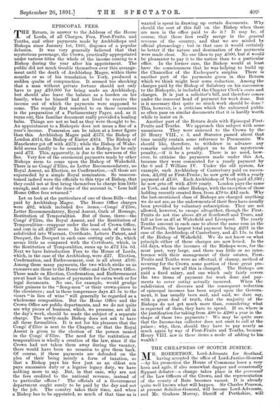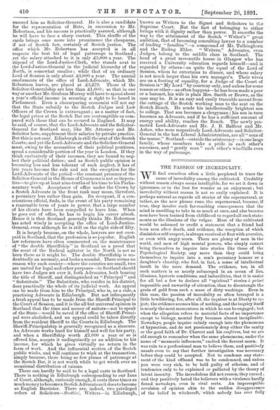THE CHEAPNESS OF SCOTCH JUSTICE . - M R. ROBERTSON, Lord-Advocate for Scotland",,
having accepted the office of Lord-Justice-General' —by his promotion the House of Commons loses a very- keen and agile, if also somewhat dapper and occasionally flippant debater—a change takes place in the personnel of the Law Officers of the Crown, and the representation of the county of Bute becomes vacant. It is already quite well known what will happen. Sir Charles Pearson, at present Solicitor-General, will become Lord-Advocate, and Mr. Graham Murray, Sheriff of Perthshire, wily succeed him as Solicitor-General. He is also a candidate for the representation of Bute, in succession to Mr. Robertson, and his success is practically assured, although he will have to face a sharp contest. This shuffle of the cards brings once more into prominence the cheapness, if not of Scotch law, certainly of Scotch justice. The office which Mr. Robertson has accepted is in all respects the best bit of legal patronage in Scotland ; yet the salary attached to it is only £5,000 a year. The stipend of the Lord-Justice-Clerk, who stands next to the Lord-Justice-General in the judicial hierarchy of the North, is somewhat smaller ; while that of an ordinary Lord of Session is only about £3,000 a year. The annual emoluments of the office of Lord-Advocate, which Mr. Robertson leaves, are placed at £3,279. Those of the Solicitor-Generalship are less than £1,000 ; so that in one way or another Mr. Graham Murray will have to spend about a year's official income in securing a right-to be heard in Parliament. Even a cheeseparing economist will not say that the State subsidy to the Scotch Judges and Law Officers of the Crown is extravagant ; as a matter of fact, the legal prizes at the Scotch Bar are contemptible as com- pared with those that can be secured in England. It may be said, of course, that the Lord-Advocate and the Solicitor- General for Scotland may, like Mr. Attorney and Mr. Solicitor here, supplement their salaries by private practice." But this is not easy. Edinburgh is still the seat of the Scotch Courts; and yet the Lord-Advocate and the Solicitor-General must, owing to the necessities of their political positions, spend a considerable portion of the year in London. If they think exclusively of their incomes, they are bound to neg- lect their political duties ; and as Scotch public opinion is becoming less and less tolerant of such neglect, it has of late years become the rule and not the exception for the Lord-Advocate of the period—the constant presence of the Solicitor-General in'the House of Commons is not so impera- tive—to give up at least nine-tenths of his time to his Parlia- mentary work. Acceptance of office under the Crown by a Scotch Advocate in the front rank may mean, therefore, a pecuniary loss rather than gain. Its occupant, if a con- scientious official, finds, in the event of his party remaining a reasonable term of years in power, that a large number of his clients have been compelled to leave him. When he goes out of office, he has to begin his career afresh. Hence it is that Scotland generally thinks Mr. Robertson has acted wisely in accepting the office of Lord-Justice- General, even although he is still on the right side of fifty.
It is largely because, on the whole, lawyers are not over- paid in Scotland, that the profession is so popular. English law reformers have often commented on the maintenance of "the double Sheriffship" in Scotland as a proof that the scent of the Radical agitator in the North is not so keen there as it might be. The double Sheriffship is un- doubtedly an anomaly, and looks a scandal. There seems no reason why each county—where the counties are small, two are united for legal and other purposes—in Scotland should have two Judges set over it, both Advocates, both bearing the title of Sheriff, and distinguished as "Principal" and " Substitute." The Substitute, who resides in his district, does practically the whole of its judicial work. An appeal can be made from him to the Principal, who is, as a rule, a practising Advocate in Edinburgh. But not infrequently a fresh appeal has to be made from the Sheriff-Principal to the Court of Session, and it is the all but universal opinion in Scotland that the time and money of suitors—not to speak of the State—would be saved if the office of Sheriff-Princi- pal were abolished, and an appeal could be taken directly from the resident Sheriff to the Courts in Edinburgh. The Sheriff-Principalship is generally recognised as a sinecure. An Advocate works hard for himself and well for his party, and when a Sheriffship worth £1,000 a year or so is offered him, accepts it undisguisedly as an addition to his income, for which he gives virtually no return in. the form of work. And the influential section of the Scotch public winks, and will continue to wink at the transaction, simply because, there being so few plums of patronage at the Scotch Bar, it is not worth while to get wroth over an occasional distribution of raisins.
There can hardly be said to be a legal caste in Scotland. There is nothing in Edinburgh corresponding to our Inns of Court, although, curiously enough, it costs three times as much money to become a Scotch Advocate as it does to become an English Barrister. There are, indeed, two privileged orders of Solicitors--Scottice, Writers—in Edinburgh, known as Writers to the Signet and Solicitors to the Supreme Court. But the fact of belonging to either brings with it dignity rather than power. It smooths- the way to the attainment of the Scotch " Writer's " great ambition, that of becoming consulting lawyer to a number of leading " families "--a compound of Mr. Tulkinghorn and the Ruling Elder. " Writers," Advocates, even Judges, belong to the middle class in Scotland. The bead of a great mercantile house in Glasgow who has received a University education. regards himself—and is regarded by others—as quite the equal of the Lard of Session, whom he entertains to dinner, and whose salary is not much larger than his own manager's. Their wives are on a footing of equality, for a Judge of the Court of Session is " My Lord ' by courtesy only, and unless for some reason or other—as often happens—he has been made a peer or a baronet, his wife is plain Mrs. Smith or Brown, as the case maybe. It is an easy and easily traceable ascent from the cottage of the Scotch working man to the seat on the Scotch Bench. He sends his intellectually• brightest son to college. That son becomes a• clergyman ; his son in turn. becomes an Advocate, and if he has a sufficient amount of energy and ability, reaches the Bench. The newly pro- moted Lord-Advocate and Mr. J. B. Balfour and. Mr. Asher, who were respectively Lord-Advocate and Solicitor- General in the last Liberal Administration, are all " sons of the manse." Scotland--outside the aristocracy—is one large family, whose members take a pride in each other's successes, and " gently scan" each other's windfalls even in the way of patronage.



































 Previous page
Previous page